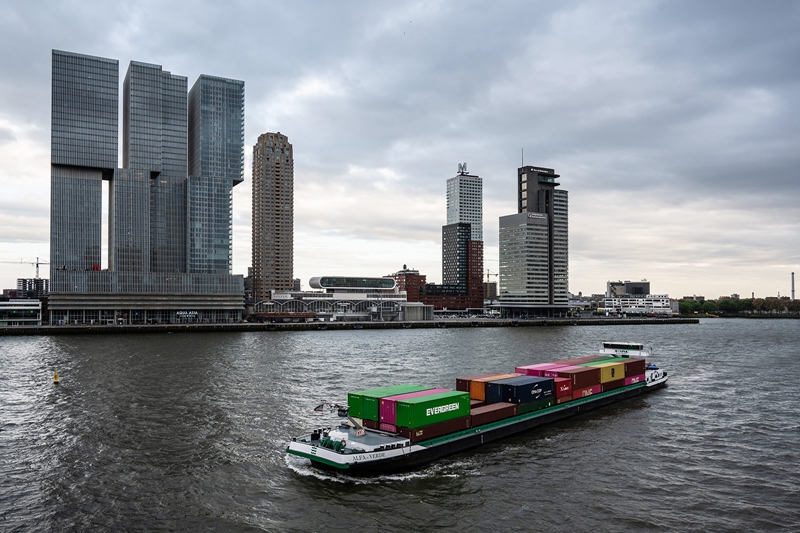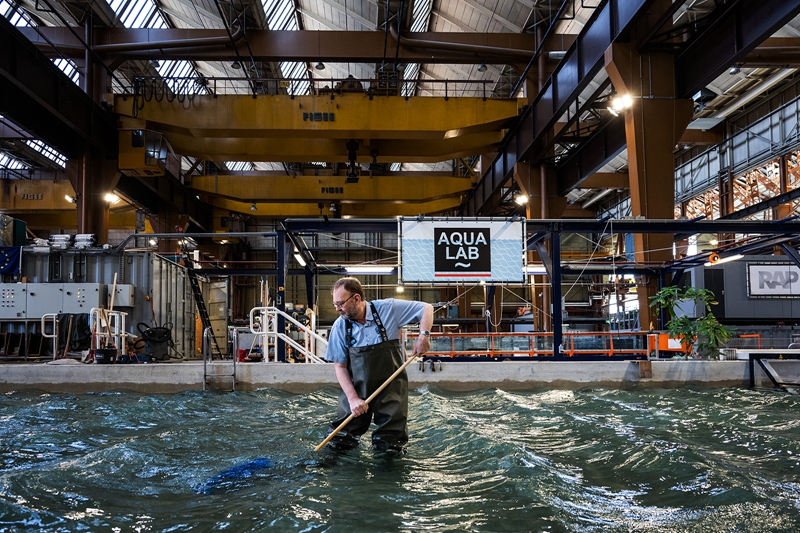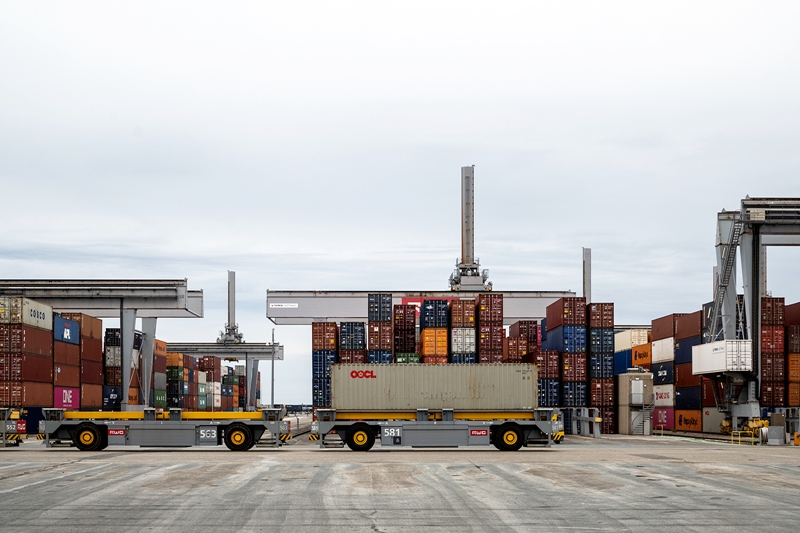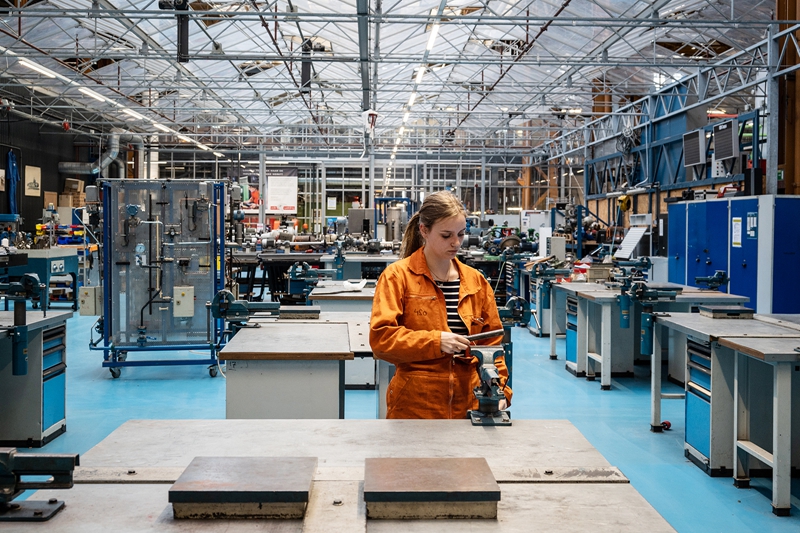Rotterdam: The Smartest Port in the World
Text and photos by Alessandro Gandolfi/Parallelozero
Abridged by Syharn Shen (沈思含)
Rotterdam: The Smartest Port in the World
Text and photos by Alessandro Gandolfi/Parallelozero
Abridged by Syharn Shen (沈思含)

Barges take advantage of inland waterways to transport goods into the Netherlands and onward into continental Europe.
In the mid-nineteenth century, a ship departing from Rotterdam would take no less than 162 days to reach the island of Java, Indonesia, and 35 ships were needed to leave the port. The city of Rotterdam at that time was at a Hamletic crossroads: to find a wider and deeper route to the North Sea, or head for a slow, inexorable commercial decline.
The solution to the dilemma laid in a leather bag that is now on display in the city's Nautical Museum. That bag contains the visionary plans of an engineer named Pieter Caland, who by the age of 30, had imagined a new canal dug 20 kilometres along the Rhine delta, among farmland, sand dunes and tons of silt. That canal—later called Nieuwe Waterweg—was built and inaugurated in 1872, and was a titanic feat that allowed Rotterdam to become the world's busiest port in the 20th century.
Today, 90% of the goods on our planet are still shipped by sea and between 1990 and 2020 maritime trade has quadrupled. But since the 2000s, the Dutch port has progressively dropped to tenth place, ceding primacy almost exclusively to Chinese ports. Rotterdam has maintained its supremacy in Europe and today it has other priorities, with one in particular: to become the world's smartest port.

A man works in the simulation tank created by Aqua Lab, which has premises in the Rotterdam Makers District (RDM). The Port of Rotterdam employs 174,000 people and alone generates 3% of the Dutch GDP.
It's a very challenging project with a long series of steps: more efficient logistics, digitization of docks and yards, increasingly sustainable transport, constant research in innovation. And a decisive energy transition, especially to hydrogen. Rotterdam aims to become Northern Europe's most important distribution hub for hydrogen while contributing to its production through oil refining and the construction of wind farms that will convert energy into hydrogen.
Still one of the main sources of air pollution in Northern Europe, the port has a most difficult objective—to cut down the 14 million tonnes of CO2 produced yearly. The ambitious plan is to halve this figure by 2030 and reduce it to zero by 2050. To do this, the Rotterdam Port Authority together with the EU has launched a project called Porthos that envisages the capture, transport and storage of 2.5 million tonnes of CO2 per year for 15 years in an empty gas reservoir located 20 kilometres off the coast and 3,000 metres below the seabed.
Due to its geographical location, the Port of Rotterdam has always been the leader of a much larger port system in and out of the continent, together with Antwerp in Belgium, Le Havre in France, and Hamburg and Bremen in Germany. In this intricate labyrinth of canals over 42 kilometres long, goods arrive from all over the world, which then—by road, rail, pipeline or waterway—depart for a European internal market of almost 350 million people. In 2020, almost 29,000 ships unloaded about 15.3 million TEU ("twenty-foot equivalent unit," in practice the volume of a standard container) in Rotterdam, despite the pandemic and the Suez accident.

An automated self-driving transporter of containers moves at the Rotterdam World Gateway, the cutting-edge terminal developed recently in the western part of the port. Here, everything moves in unison, trailers move without a driver, containers are loaded by computer-controlled cranes, and it is rare to meet a single person.
Half-destroyed during the Nazi bombings in 1940, the Port of Rotterdam has continued to expand and develop thanks to the progressive reduction of trade barriers between the EU states. Today it is home to petrochemical industries, biofuel plants, Europe's largest refineries and the world's most automated and innovative terminals, like the Rotterdam World Gateway (RWG), where 24-hour self-driving electric trucks move state-of-the-art digitalized containers. Container 42, a container of the future "will be totally green, equipped with GPS and sensors that will allow it to move on its own and be hyper-connected," explains Erwin Rademaker from the company developing the smart container.
In recent years, the port has become a huge ecosystem of brilliant minds housed in old shipyards on the edge of the city. Taking a stroll through the Rotterdam Makers District is like stepping into a huge campus for young creative scientists, all busy developing their ideas. There are floating wind turbines by X Laboratory, small 1,000-purpose submarines by Marin, new anti-corrosion alloys by RamLab and the latest generation of drones that will soon be used in the port area.

An intern at work at the Rotterdam Makers District (RDM), an area of the port where private companies and startups work on research and innovation.
"The maritime industry is notoriously slow," says Mitja Caboni, a scouting manager at the non-profit PortXL, "and we act as an accelerator for innovative ideas: we work on marketing, business development, fundraising and customer research. In six years we have 'accelerated' about 100 start-ups, 90 of which are still in operation." With its primary role of seeking out talented ideas throughout Europe, PortXL has launched innovative companies such as Heliorec (which produces floating solar panels), MPS (which ensures that it can reduce a ship's fuel consumption) and RanMarine, which has invented the WasteShark, "a kind of aquatic hoover that goes around collecting floating rubbish," explains Caboni. As if to say, Pieter Caland's teaching is always relevant—it is innovative ideas that will save us.
Contact Us | Plan a Visit | Donate
8 Lide Road, Beitou 11259, Taipei, Taiwan
886-2-2898-9999
005741@daaitv.com
©Tzu Chi Culture and Communication Foundation
All rights reserved.
